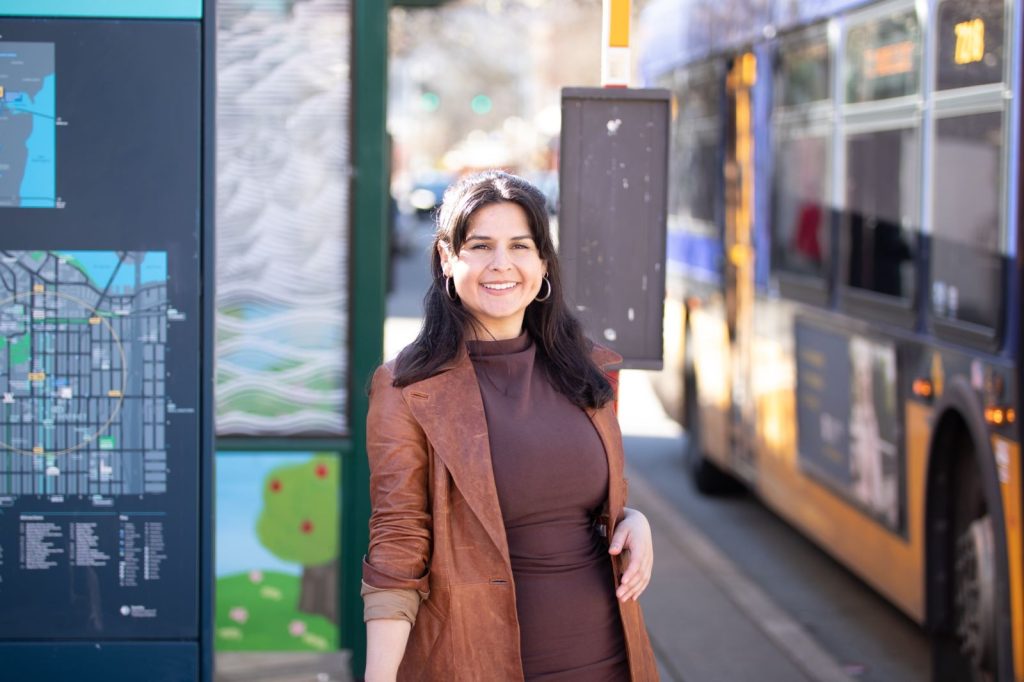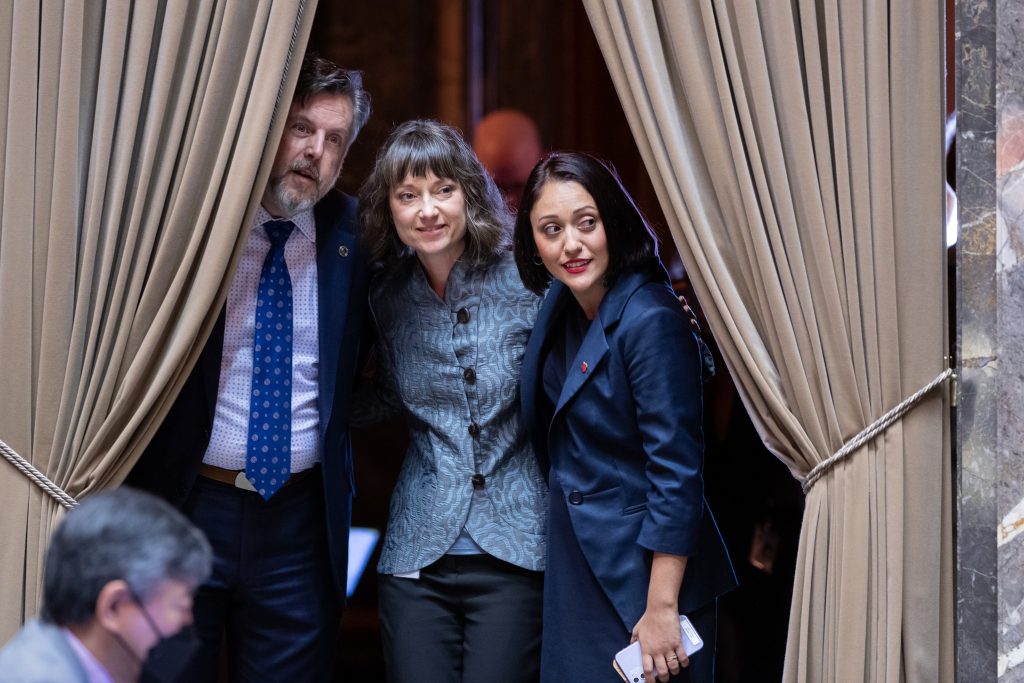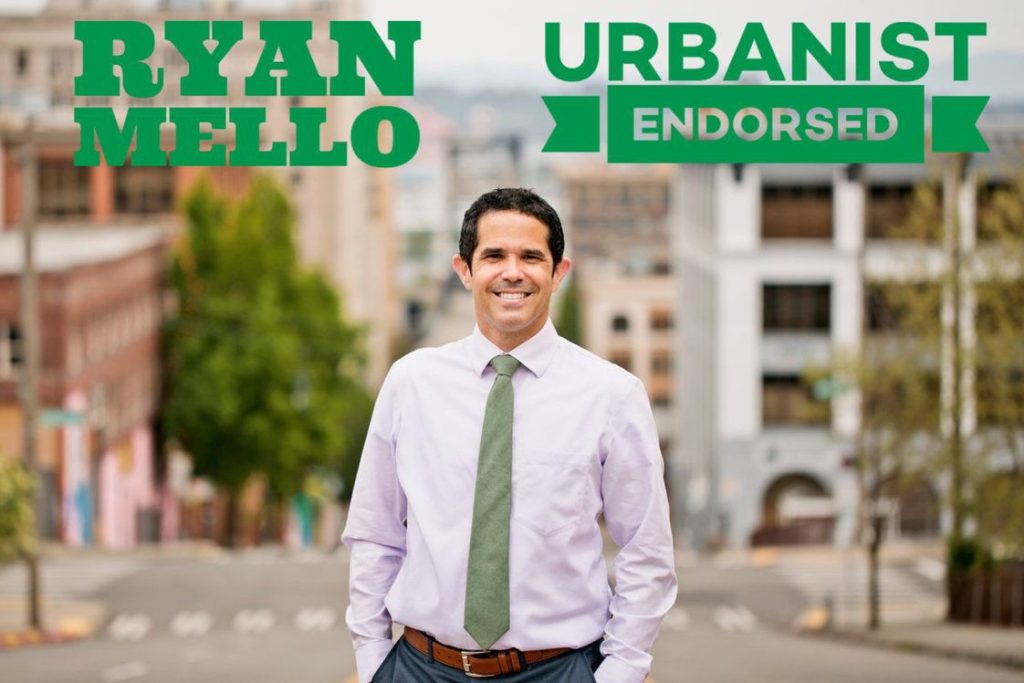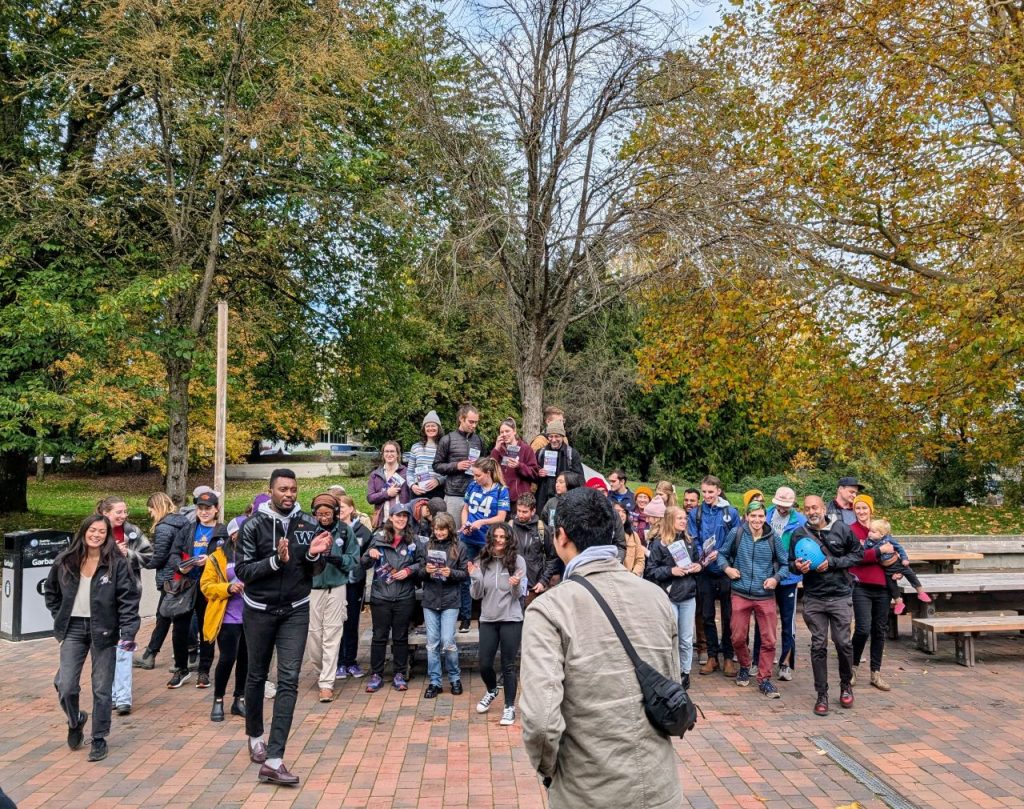
Shaun Scott, Alexis Mercedes Rinck, Ryan Mello, and Jessica Bateman will bring progressive urbanist leadership to their respective offices.
In the weeks after Donald Trump was elected a second time and Republicans secured a majority in both houses of Congress, urbanists and progressives in the Seattle area have watched with trepidation as the incoming president has nominated a motley assortment of celebrities, CEOs, and anti-vaxxers to his cabinet.
But while most of the country shifted red this election cycle, Washington state bucked that trend, sending 10 Democrats to Congress, retaining control of the legislature and governor’s mansion, and installing a host of left-leaning candidates in state, city and county offices.
In particular, four standout candidates that The Urbanist enthusiastically endorsed because of their commitment to boosting transit, housing, and climate action succeeded in being elected to new positions in November.
- Alexis Mercedes Rinck will join the Seattle City Council as one of the few progressives counterbalancing a centrist majority.
- Housing affordability superstar Jessica Bateman, who successfully pushed missing middle housing bills as a state rep from the 22nd Legislative District, won her bid to represent that same Olympia district in the state senate – and will serve as chair of the influential Housing Committee.
- Current Pierce County Council member Ryan Mello succeeded in his race to become Pierce County Executive, bringing a vision of expanded transit and walkable neighborhoods to the state’s second-most populous county.
- Shaun Scott, campaigning as a democratic socialist, will represent the 43rd district – situated in the very liberal heart of Seattle – in the state house seat formerly occupied by former speaker Frank Chopp.
The Urbanist caught up with each of these victorious candidates to hear about their priorities after taking office in 2025.
Alexis Mercedes Rinck heads to Seattle Council
Rinck defeated appointed centrist Councilmember Tanya Woo in the citywide Position 8 seat on the Seattle City Council. As a renter and transit rider who chooses not to own a car, Rinck brings a solidly urbanist viewpoint to a council that has shown more interest in boosting police salaries than dealing with the city’s housing crisis. Her resume includes serving as director of subregional planning and equitable engagement for the King County Regional Homelessness Authority (KCRHA), giving her expertise on the issue of homelessness.

Rinck’s election-night party, she said, was jubilant – for a brief moment. “For about 45 minutes, there we were, having a great time. And then we started learning about what was happening in Pennsylvania.”
Trump’s return to the presidency muted that celebratory mood, and Rinck says some of her goals in 2025 will be to prepare the city for what comes next.
“We have a lot of work to do, not just in areas I campaigned on about affordability, but also trying to mitigate whatever attacks may come for our freedoms – and the loss of federal funding that I think we can anticipate to come in the next year.”
She noted Seattle’s affordability crisis might deepen as immigrants and transgender people arrive in the city attempting to flee communities that are less welcoming and potentially even ramping up campaigns of persecution.

Pushing her agenda may be a relatively lonely endeavor, however, with Councilmember Tammy Morales the only other staunch progressive on the council. Rinck said she’ll try to convince her colleagues to pass legislation boosting housing production, noting that permitting is starting to decline.
“I want to do the work with our housing developers across the board to bring back our housing pipeline,” Rinck said. “And that will be around streamlining permitting.”
Rinck said this could include legislation targeted not just at speeding up permitting at the Department of Construction & Inspections (SDCI) but also in SDOT, City Light and Seattle Public Utilities.
“I’m really interested in doing the kind of wonky problem solving work internally to ensure that the city has a streamlined process,” she said.
She said she’s watching how the recently passed exemptions for design review in the greater downtown region work out. “Eliminating design review is something I’m interested in,” she notes, “while also looking at the current parking requirements around development.”
Funding for affordable housing is also a top priority, and after the current council agreed to shift the JumpStart corporate payroll tax revenue from being dedicated to housing and the Green New Deal to addressing the general budget shortfall, Rinck is interested in pursuing other revenue options, including Councilmember Cathy Moore’s proposed capital gains tax, which narrowly failed to pass.
“We need to be picking up that conversation,” Rinck said. “And working with our partners around what if we were to implement a local capital gains, what do we want to use those funds for?”
Jessica Bateman to lead housing push in state senate
Bateman, probably the most influential urbanist in the Washington State Legislature, was the primary sponsor of House Bill 1110, which passed into law in the 2023 session and mandates sixplex zoning in areas near transit and fourplexes in residential zones citywide in Washington’s large cities. Bateman now moves on from the House, where she’s served since 2021, to the Senate, where Democratic leadership plans to select her to chair the Senate’s Housing Committee – a platform she says she intends to use to push an agenda focused on creating more housing options statewide.

“I’m really interested in doing a lot of the work that we did in the House, making sure that we’re aligning ourselves around housing and setting ourselves up for success,” Bateman said. “So that we’re looking at symptoms and solutions. I have a whole list of ideas for next year, all centered around the same topic: increasing supply, increasing our support for affordable housing, and then stabilizing people in their homes.”
Bateman notes that a third of the Democratic caucus in the legislature will be new members. “My experience tells me that new members are closer to issues of housing – the deficit of housing and the need for housing abundance. And they’re going to be younger and more diverse.”
A top priority next year, Bateman says, will be re-introducing a version of House Bill 2113, which would require cities to abide by the rezoning requirements in her missing middle bill passed last year, and providing remedies in cities that fail to comply.
“It’s really important for us to be able to hold cities accountable and have a system of oversight to ensure that all of these land use change requirements that we’re telling the 260 cities in Washington that they have to adhere by now, for the first time ever – that we actually have a way to demonstrate that they’re doing that,” Bateman said.
“That bill includes the builders remedy, which would allow for the construction of affordable housing regardless of the underlying zoning,” Bateman said, and noted that this could also include withholding of state grants to cities – including Seattle – that fail to reform their zoning laws to meet state requirements.

Bateman also plans to use her platform to push for parking reform, including putting a cap on minimum parking requirements for affordable housing, childcare facilities, senior housing, assisted living, and nursing homes. “These are all types of housing that are desperately needed,” she said.
She’ll also be co-sponsoring another rent stabilization bill aimed at limiting rent increases, observing that “a lot of folks that are living month to month, paying a third to half of their income on their housing costs, and they’re scared. They need stability, and they need predictability.”
Bateman says she’ll also push for a bill requiring local jurisdictions to zone for permanent supportive housing, a bill to allow for splitting of lots, and another bill that she refers to as a residential and commercial corridors bill. “We want to make sure that we’re allowing housing for people to be in areas that are near transit, and also that are areas that have a lot of amenities and are livable, walkable communities.”
Ryan Mello to lead Pierce County
“Election night really was filled with mixed emotions,” says Ryan Mello, the new Pierce County Executive, who’s a vocal advocate for transit, walkable communities, and concrete action on climate. “So, while there was some real celebration and jubilation, it was really measured with strong concern about what’s going to happen federally.”
Mello, who’s currently chair of the Pierce County Council and represents District 4, will replace Republican Bruce Dammeier, who often squabbled with the current council. Mello hopes to change the executive office’s direction by being both more committed to environmentally conscious policies while taking a more collaborative approach to the council.

“We have really strong relationships with most of the council, even Republicans,” Mello said. “I’ve demonstrated that I’ve been able to work with my Republican counterparts to move an agenda.”
In just one example, Mello’s past agenda included passage in 2023 of the Maureen Howard Affordable Housing Act, which adds one tenth of a percent to the county sales tax to help address the homelessness crisis with dedicated funds for housing and services – a bill that passed with bipartisan support. Mello says that thanks to that bill, which generates about $20 million annually, there are currently over three thousand units of new affordable housing units in the pipeline in the county. He says he’ll look to keep expanding that figure during his tenure.
As county executive, Mello says he’ll also be a strong advocate for moving transit projects forward, both as a member of the Sound Transit board and, he hopes, serving on the Puget Sound Regional Council and the Pierce Transit Board. “I’m going to be a really vocal advocate for express bus service, and meeting the promises made about extending Sounder commuter rail to DuPont” – which, according to Sound Transit’s current timeline, isn’t scheduled to be operational until 2045.
Increasing revenue to boost transit service will be a big priority for his incoming administration, Mello says. He noted that Pierce County has only narrowly rejected ballot measures to increase transit-dedicated sales tax revenue from the current six-tenths of a percent to the state maximum threshold of nine-tenths of a percent.
“We’ve come really, really close – within just a few 100 votes in the last 15 years – asking voters to invest more in mobility options,” he said. “So we’ve got to try again in order to increase the really vital services that Pierce Transit offers.”
Preventing sprawl by limiting growth in rural areas is also on the agenda – something Mello worked on as a county councilmember to include in the county’s comprehensive plan, which will be finalized by the end of this year.
“Rural growth is very expensive to serve, spreading people farther and farther out into the rural areas,” Mello said. “They rightfully expect sheriff deputies to come when they call and water and sewer and roads and sidewalks and schools and parks.” Mello hopes to eliminate the county’s rural density bonus, which currently doubles the existing allowance of one dwelling per ten acres.
Mello, the first openly gay man to serve on the Tacoma city council, is extremely concerned about a second Trump administration – both because of potential cuts to critical anti-poverty programs like Community Development Block Grants and federal dollars for Sound Transit projects – as well as impacts on vulnerable communities.
“There are a lot of things on my mind,” he said. “About how we’re treating immigrants and refugees. Reproductive freedom and our standing on the world stage. And our ability to really get at the climate crisis.”
Mello said he’s committed to pushing policies that reduce greenhouse gases, even as other issues threaten to distract people’s attention. “Our strategy has always been to show best practices here locally on things like climate,” he said, “and how we can bring climate solutions to scale.”
Shaun Scott takes baton from former House Speaker Frank Chopp
Shaun Scott has some big shoes to fill. The 43rd district House seat he won in November was previously held by former speaker Frank Chopp for three decades. Scott’s district, which encompasses parts of downtown, Capitol Hill, Fremont and the U District, is probably the most dependably progressive district in the state – and as a result, Scott will likely bring a very left-leaning, transit-forward, renter-oriented vision to the legislature.

“Trump’s election is going to direct a lot of people’s eyes towards the state legislature,” Scott said of the challenges facing Democrats holding a trifecta in Olympia. “Hopefully that’s going to be a spur to my fellow colleagues to make sure that we’re doing everything we can to Trump-proof our state.”
As a declared socialist, it’s no surprise that Scott says he’ll focus on passing additional tax revenue to create a stronger social safety net, build more affordable housing, and boost transit service statewide. He said one of his top priorities will be to increase the real estate excise tax on properties valued at over $3 million.
“Right now, most of the investments we make as a state for affordable housing, $1.5 billion or so, mostly come from the Housing Trust Fund,” Scott said. “The real estate excise tax [increase] would add close to another billion – that’s with a B, as in Bill Gates – to that total.”
In a district where nearly three quarters of residents are renters, Scott is a big proponent of rent stabilization and he says he’ll work with colleagues to ensure another bill that limits rent increases will be introduced in the next session.

Scott will also focus on seeking new funds to ensure projects like Sound Transit don’t fall behind in the face of cuts to federal funds. “We have a good number of light rail street improvement projects, and transit projects that are contingent on federal funds that might dry up.”
He’s also interested in doing more to tax polluters, investigating a statewide universal health care system, and doing more to ensure that people in affordable housing can access physical and mental health care services.
“When we make that push to make sure we’re building enough social housing – and that includes housing for people who have intellectual and developmental disabilities – we should be using that housing to connect people to services, and scaling up organizations like CoLead and the Pacific Hotel,” Scott said.
“Those are going to be the measures that will show everybody that Washington has enough resources to address some of our biggest challenges, regardless of what happens in the other Washington.”

Andrew Engelson
Andrew Engelson is an award-winning freelance journalist and editor with over 20 years of experience. Most recently serving as News Director/Deputy Assistant at the South Seattle Emerald, Andrew was also the founder and editor of Cascadia Magazine. His journalism, essays, and writing have appeared in the South Seattle Emerald, The Stranger, Crosscut, Real Change, Seattle Weekly, the Seattle Post-Intelligencer, the Seattle Times, Washington Trails, and many other publications. He’s passionate about narrative journalism on a range of topics, including the environment, climate change, social justice, arts, culture, and science. He’s the winner of several first place awards from the Western Washington Chapter of the Society of Professional Journalists.
